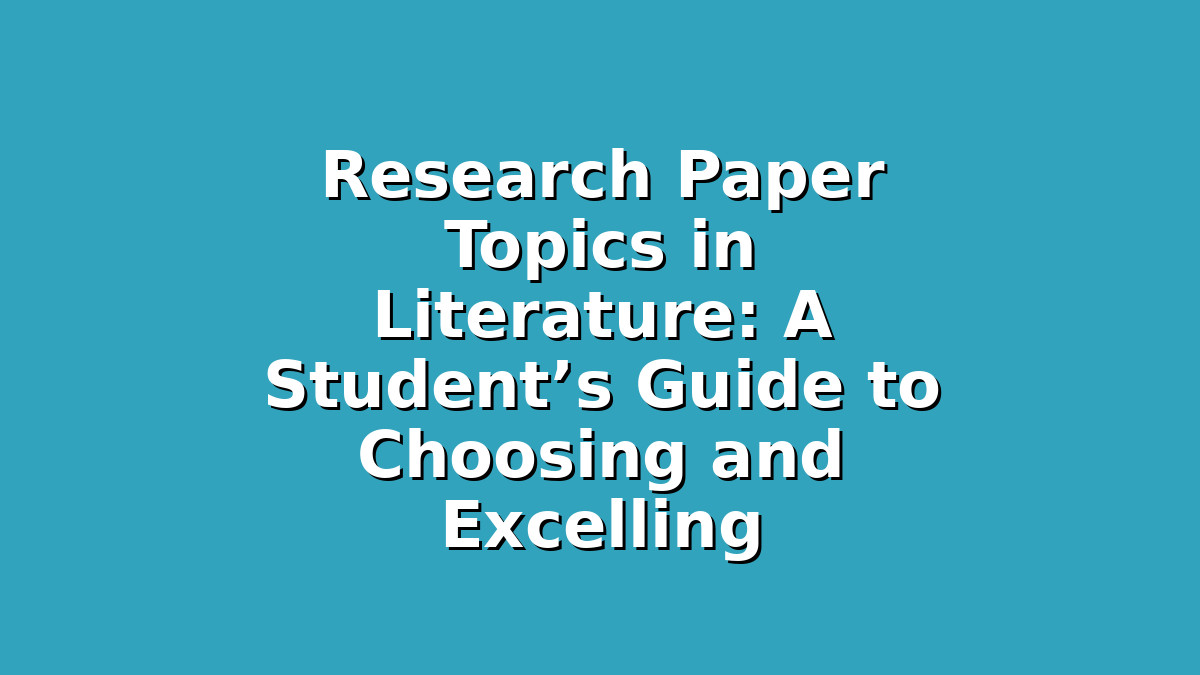Writing a research paper in literature can feel overwhelming, especially when you’re preparing for exams or trying to improve your study habits. Whether you’re analyzing a classic novel, exploring poetry, or diving into modern literary criticism, picking the right topic is the first crucial step toward success. This guide will help you find compelling research paper topics in literature while also offering practical study tips to boost your confidence and performance.
Why Choosing the Right Research Paper Topic Matters
Before diving into specific topics, it’s important to understand why selecting a good research paper topic in literature matters. A well-chosen topic should interest you, align with your course objectives, and provide enough scope for analysis. When you’re genuinely curious about your topic, your research becomes more enjoyable and your arguments stronger. Additionally, a focused topic will help you manage your time effectively and avoid last-minute stress.
Now, let’s explore three key sections that will guide you in picking excellent research paper topics and preparing for your literature assignments with success.
—
1. Exploring Classic Literature Topics: Timeless Themes and Characters
Classic literature offers a treasure trove of research paper topics because of its enduring themes, complex characters, and rich cultural contexts. If you’re studying famous authors like Shakespeare, Jane Austen, or Charles Dickens, here are some productive angles to consider:
– Character Analysis: Focus on the development and motivations of a key character. For example, “The role of Hamlet’s indecision in Shakespeare’s *Hamlet*” or “Elizabeth Bennet’s challenge to social norms in *Pride and Prejudice*.”
– Themes and Symbols: Explore universal themes like love, power, identity, or conflict. You could write about “The use of light and darkness imagery in *Macbeth*” or “Social class and mobility in *Great Expectations*.”
– Historical Context: Analyze how the time period influenced the text. For instance, “Victorian attitudes toward gender roles in the works of Charles Dickens” or “The impact of the Renaissance on Shakespeare’s plays.”
Study Tip: When working with classic literature, create a timeline or character map to visualize connections. This will help you remember key plot points and deepen your understanding of themes, making it easier to write a focused paper.
—
2. Contemporary Literature and Diverse Voices: Engaging with Modern Issues
If you prefer modern works, contemporary literature offers fresh perspectives and often addresses current social issues. This can be a great way to connect your academic work with the world around you. Here are some topic ideas:
– Cultural Identity and Migration: Consider topics like “Exploring cultural hybridity in Jhumpa Lahiri’s stories” or “The immigrant experience in Chimamanda Ngozi Adichie’s *Americanah*.”
– Gender and Sexuality: Analyze representations of gender roles or LGBTQ+ themes. For example, “The construction of masculinity in Junot Díaz’s *The Brief Wondrous Life of Oscar Wao*” or “Queer identity and resistance in Alison Bechdel’s graphic memoirs.”
– Technology and Society: Examine how modern literature reflects digital age challenges, such as “Surveillance and privacy in Dave Eggers’ *The Circle*” or “Social media and identity in contemporary young adult fiction.”
Study Tip: For contemporary topics, keep an eye on literary journals, author interviews, and book reviews. These sources provide up-to-date interpretations that can enrich your argument and demonstrate critical engagement.
—
3. Literary Theory and Critical Approaches: Deepening Your Analysis
For students interested in taking their papers to an advanced level, integrating literary theory can open new analytical pathways. Literary theories help you examine texts from different perspectives and can make your research unique and compelling. Here are some approaches and potential topics:
– Feminist Criticism: Investigate how texts portray gender inequalities or female empowerment. Example topic: “A feminist reading of *The Handmaid’s Tale* by Margaret Atwood.”
– Postcolonial Theory: Analyze literature produced in or about formerly colonized countries. Topic idea: “Postcolonial identity and resistance in Salman Rushdie’s *Midnight’s Children*.”
– Psychoanalytic Criticism: Use Freudian or Jungian theory to explore characters’ subconscious motives. For instance, “The Oedipal complex in Sophocles’ *Oedipus Rex*.”
Study Tip: When applying literary theory, create a glossary of key terms and theorists. Refer back to this glossary while writing to ensure you’re using concepts correctly, which strengthens your credibility and clarity.
—
Conclusion: Taking Control of Your Literature Research Paper
Choosing a research paper topic in literature doesn’t have to be intimidating. Start by reflecting on what interests you most—whether that’s classic novels, contemporary voices, or critical theory—and then narrow your focus to a manageable question. Remember to organize your notes, use credible sources, and draft an outline before diving into the writing process. With these strategies and topic ideas, you’ll not only finish your paper on time but also develop analytical skills that will serve you well in exams and beyond.
Stay curious, keep reading, and trust your ability to craft insightful, well-supported arguments. Your effort will pay off in better grades and deeper appreciation for literature.
Good luck!

Responses